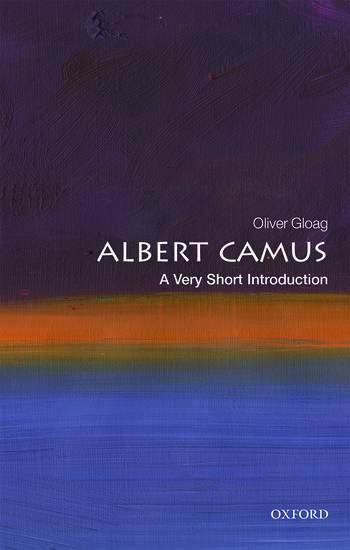Home >
A Very Short Introduction >
Albert Camus (Literature)
A Very Short Introduction | Literature
Albert Camus
ISBN: 9780198792970
Series: A Very Short Introduction
Albert Camus (Literature)
A Very Short Introduction Albert Camus (Literature) Media > Books > Non-Fiction > Education Books Expect Delays of Up to 4 Weeks| Order Below |
ISBN
9780198792970 (10-digit ISBN: 0198792972)
- Description
- Key Features
- Series Description
- Table of Contents
- Explores the life and work of Albert Camus, major cultural icon of the twentieth century
- Offers a comprehensive view of Camus' major works and interventions including his notion of the absurd and revolt
- Analyses the enduring popularity of Camus in connection with contemporary political, social, and cultural issues
Few would question that Albert Camus (1913-1960), novelist, playwright, philosopher and journalist, is a major cultural icon. His widely quoted works have led to countless movie adaptions, graphic novels, pop songs, and even t-shirts.
In this Very Short Introduction, Oliver Gloag chronicles the inspiring story of Camus' life. From a poor fatherless settler in French-Algeria to the winner of the Nobel Prize for Literature, Gloag offers a comprehensive view of Camus' major works and interventions, including his notion of the absurd and revolt, as well as his highly original concept of pure happiness through unity with nature called "bonheur". This original introduction also addresses debates on coloniality, which have arisen around Camus' work.
Gloag presents Camus in all his complexity a staunch defender of many progressive causes, fiercely attached to his French-Algerian roots, a writer of enormous talent and social awareness plagued by self-doubt, and a crucially relevant author whose major works continue to significantly impact our views on contemporary issues and events.
Oxford's Very Short Introductions series offers concise and original introductions to a wide range of subjects--from Islam to Sociology, Politics to Classics, Literary Theory to History, and Archaeology to the Bible.
Not simply a textbook of definitions, each volume in this series provides trenchant and provocative--yet always balanced and complete--discussions of the central issues in a given discipline or field. Every Very Short Introduction gives a readable evolution of the subject in question, demonstrating how the subject has developed and how it has influenced society. Eventually, the series will encompass every major academic discipline, offering all students an accessible and abundant reference library.
Whatever the area of study that one deems important or appealing, whatever the topic that fascinates the general reader, the Very Short Introductions series has a handy and affordable guide that will likely prove indispensable.
Please note: As this series is not ELT material, these titles are not subject to discount.
Preface
1: Camus, son of France in Algeria
2: Camus, from reporter to editorialist
3: Camus and the absurd
4: Rebel without a cause
5: Camus and Sartre — the breaks that made them inseparable
6: Camus and Algeria
7: Camus' legacies
Further reading
Index
Few would question that Albert Camus (1913-1960), novelist, playwright, philosopher and journalist, is a major cultural icon. His widely quoted works have led to countless movie adaptions, graphic novels, pop songs, and even t-shirts.
In this Very Short Introduction, Oliver Gloag chronicles the inspiring story of Camus' life. From a poor fatherless settler in French-Algeria to the winner of the Nobel Prize for Literature, Gloag offers a comprehensive view of Camus' major works and interventions, including his notion of the absurd and revolt, as well as his highly original concept of pure happiness through unity with nature called "bonheur". This original introduction also addresses debates on coloniality, which have arisen around Camus' work.
Gloag presents Camus in all his complexity a staunch defender of many progressive causes, fiercely attached to his French-Algerian roots, a writer of enormous talent and social awareness plagued by self-doubt, and a crucially relevant author whose major works continue to significantly impact our views on contemporary issues and events.
Key Features
- Explores the life and work of Albert Camus, major cultural icon of the twentieth century
- Offers a comprehensive view of Camus' major works and interventions including his notion of the absurd and revolt
- Analyses the enduring popularity of Camus in connection with contemporary political, social, and cultural issues
Series Description
Oxford's Very Short Introductions series offers concise and original introductions to a wide range of subjects--from Islam to Sociology, Politics to Classics, Literary Theory to History, and Archaeology to the Bible.
Not simply a textbook of definitions, each volume in this series provides trenchant and provocative--yet always balanced and complete--discussions of the central issues in a given discipline or field. Every Very Short Introduction gives a readable evolution of the subject in question, demonstrating how the subject has developed and how it has influenced society. Eventually, the series will encompass every major academic discipline, offering all students an accessible and abundant reference library.
Whatever the area of study that one deems important or appealing, whatever the topic that fascinates the general reader, the Very Short Introductions series has a handy and affordable guide that will likely prove indispensable.
Please note: As this series is not ELT material, these titles are not subject to discount.
EASY ORDER FORM
PRICES LISTED INCLUDE CONSUMPTION TAX
Price Before Tax:
¥1,790


